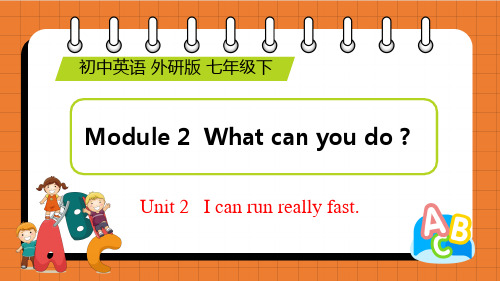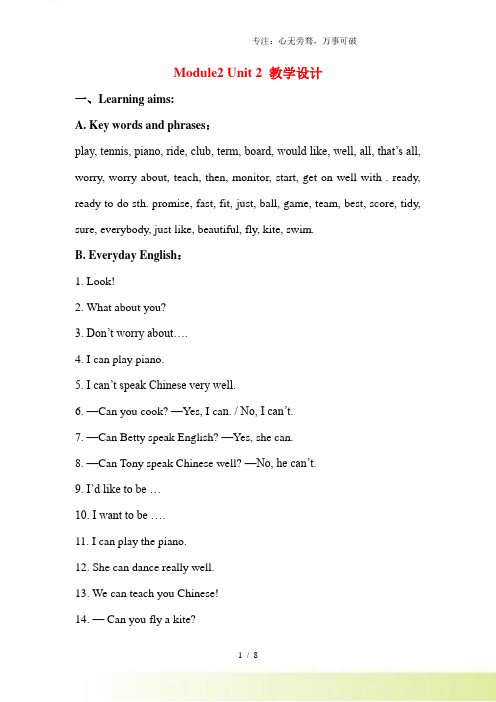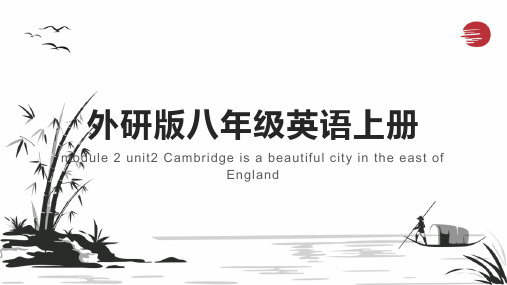Module2unit2
Module2 Unit2 课件 外研版英语七年级下册

2 Read the passage and check(√) the true sentences.
It’s the start of the new term and we’re choosing our new monitors.
I’d like to be the class monitor. I get on well with everyone, classmates and teachers. I work very hard, and I do well at school. I’m kind and I’m always ready to help others. I can even help teachers too. Choose me as your class monitor and I promise to help YOU!
2. Which monitor does Lingling want to be for her class? The class monitor.
3. Which monitor does Daming want to be for his class? The PE monitor.
4. Which monitor does Tony want to be for his class? The cleaning monitor.
她花了很长时间才做好去教Байду номын сангаас的准
备。
I don’t know about you, but I’m
be ready for
意为“为……做好了准 ready for bed. 备”,强调准备的状态。 我不知道你怎样,但是我准备睡觉
了。
外研版小学英语(三起)四年级下册Module2Unit2教材内容全解

外研版小学英语四年级下册Module2Unit2教材内容全解Module2Unit2教材内容全解Module2Unit2 It’s very old.它非常古老。
1.Listen ,point and say.听一听,指一指,说一说【情景详解】英语描述:Two birds are talking about their homes.汉语描述:两只小鸟正在谈论它们(各自)的家。
【课文全译】This is my home.It’s old. 这是我的家。
它非常古老。
This is my home.It’s very famous.这是我的家。
它非常著名。
【课文注解】①home(名词)家,短语:at home在家,例句:We have a beautiful home in the city.我们在城市里有个美丽的家。
【辨析】home,house和family:home的意思是“家”,主要指一个人出生或居住的地方,因而也有“家乡,故乡”的意思,它具有house 所没有的感情色彩(如“团聚”“思念”等)。
house的意思是“房屋,住宅”,一般指家人所居住的建筑物。
family的意思是“家庭,家庭成员”,与居住的房子无关。
例句:My family are very nice.我的家人很友好。
There are many new houses in our village.我们村里有很多新房子。
I always stay at home on Sundays.我经常周日呆在家里。
②old(形容词)年代久的,古老的,例句:Some houses in the city are very old.城市里的一些房子年代已经很久远了。
old的反义词new 新的,例句:I have a new skirt.我有一条新女裙。
old作形容词时,还可意为“老的,年老的”,反义词是young年轻的,例句:We should respect the old people.我们要尊敬老年人。
外研版英语六年级上册-Module 2 Unit 2(课件)

Practice
• There is __a_C_h_a_n_g_j_ia_n_g__R_i_v_e_r in China. • There is ____a_W__e_st_L__a_k_e____in China. • This is ___a__G_r_e_at_W__a_l_l ___in China.
Practice
1)_T_h_e_r_e’_s_a famous mountain in Anhui. It’s the Huangshan mountain.
2)_T_h_e_r_e_a_r_e_lots of lake in China.
3) There is _a__H__u_a_n_g_s_h_a_n__m_o_u_n_t_a_i_n_in China.
定义: 表示某处存在某物或某人。 结构: There is + 单数可数名词/不可数名词 + 地点状语 There are + 复数名词 + 地点状语
Look and learn
There be 口诀
• There be有特点,主语放在be后面。 • 单数主语用is ,复数主语要用are。 • 变否定很简单,be后要把not添。 • 变疑问也不难,把be提到there前。 • 否定疑问any换,就近原则多多练。
Module 2 Unit 2 There are lots of beautiful
lakes in China
• There are lots of places in China.
Look and learn
North
East West
South
Look and learn
There be 句型
2023年外研版七年级英语下册Module2 Unit 2 教学设计

Module2 Unit 2 教学设计一、Learning aims:A. Key words and phrases:play, tennis, piano, ride, club, term, board, would like, well, all, that’s all, worry, worry about, teach, then, monitor, start, get on well with . ready, ready to do sth. promise, fast, fit, just, ball, game, team, best, score, tidy, sure, everybody, just like, beautiful, fly, kite, swim.B. Everyday English:1. Look!2. What about you?3. Don’t worry about….4. I can play piano.5. I can’t speak Chinese very well.6. —Can you cook? —Yes, I ca n. / No, I can’t.7. —Can Betty speak English? —Yes, she can.8. —Can Tony speak Chinese well? —No, he can’t.9. I’d like to be …10. I want to be ….11. I can play the piano.12. She can dance really well.13. We can teach you Chinese!14. — Can you fly a kite?—Yes, I can. / No, I can’t.C. Teaching aims:1. Function: Finding out what people can do; asking and answering about abilities2. Structure: can / can’t3. Skills: 1)Listening and finding out about people’s abilities.2) Supplying information on p eople’s abilities.3)Reading and understanding simple passages, finding specific information4) Composing a simple passage4. Around the world: Languages5. Task: Making a poster for a club.二、Keys and Difficulties:The correct usage “can and can’t”.三、Teaching plan:Unit 2 I can run really fast.ⅠTeaching modelReading and writing.ⅡTeaching methodTop-down approachⅢTeaching keys and difficulties.The key points:a.key vocabulary and phrases: monitor, start, get on well with .ready, ready to do sth. promise, fast, fit, just, ball, game, team,best, score, tidy, sure, everybody, just like, beautiful, fly, kite,swimb.key structures:I’d like to be…I want to be….Difficulties.To write something about the monitor you would like to be.ⅣTeaching Aims1.Knowledge Aims:a.to grasp the key words and phrase.b.To get information from the reading material.2.Ability Aims:a.To get the Ss to describe the personal advantages and abilitiesb. To discuss about running for class monitorsc. To know which monitor the students would like to be for yourclass.d. To write something about the monitor you would like to be.3.Emotional Aims:To develop their awareness that we should affirm one’s ability and enhance self-confidence.ⅤTeaching aidsRecorder, PPT, videoⅥTeaching StepsStep 1 Warming-up and learn the vocabulary(3’)1. Show some pictures to review the words. .2. Read the words after the top student.4. Introduce the new words.Step 2 Discussion: work in pairs(4’)1. Show some pictures to tell the students what the class monitor, PE monitor and the cleaning monitor should do.2. Work in pairs. Ask and answer the questions.1) Which monitor would you like to be for your class?Class monitorPE monitorCleaning monitor2) What do these monitors do?Step 3 Listen and Fast Reading.(6’)1. Play the recording.2. Ask the students to read through the passage.3. Read the passage and check (√) the true sentences.1) Lingling doesn’t get on well with others.2) Lingling is kind to everyone.3) Daming is good at sport so he wants to be the PE monitor.4) Daming plays football for the school.5) Tony doesn’t like cleaning.6) Tony’s home is tidy.4. Check with a partner.5. Call back the answers from the whole class.Keys: 1. ×2. √3. √4. ×5. ×6.√6. Read the text together.Step 4 Intensive Reading (8’)1.Ask Ss to read silently and carefully, get the Ss to underline the difficulties.2..Explain the language points.Step 5 Practice(4’)1. Ask the students to read through the passage in Activity 3.How to choose your monitorsA good class monitor gets on well with (1) classmates / everybody and (2) promises likes to help you.A good PE monitor enjoys sport and is usually (3) fit / tidy. They often play (4) basketball / the piano or other sports in the school (5) team / class. They always try to get the best (6) score / help in a match.A good cleaning monitor is (7) bad / good at cleaning. They make the classroom (8) just / best like home.2. Underline the correct words.3. Check with a partner.4. Call back the answers from the whole class.Keys: 1. everybody 2. promises 3. fit 4. basketball 5. team 6. score 7. good 8. best5. Read the passage together.Step 6 Complete the sentences (4’)1. Ask the students to the words in the box in Activity 4.get on well with good at ready to2. Ask the students to read through the sentences in Activity 4.1) Lingling is a kind girl and she is always _______________ help others.2) Everybody likes her because she _____________ others.3) Daming plays football and is _____________ sports.3. Check with a partner.4. Call back the answers from the whole class.5. Read the passage together.Keys: 1. ready to 2. gets on well with 3. good atStep 7 Work in pairs(5’)1. Choose the best classmates to be the monitors in Activity 1. Say:Who they are and what job they can doWhy they can do it2. Write a passage about one of the monitors in Activity 5. Use the passage in Activity 2 to help you.3. Check with a partner.4. Call back the answers from the whole class.Step 8 Do exercises(6’)完成句子:1. 我与全班同学都相处得很好。
新外研版八年级上册英语 Module 2 Unit2 教案(教学设计)

Module 2 My home town and my countryUnit 2 Cambridge is a beautiful city in the east ofEngland.单词south west north home town island area1. To tell the difference among the words: near, opposite, along, on the left/right, across2. To learn some expressions about asking ways and giving directions.3. To learn the reading method.1、能读懂关于介绍剑桥、伦敦、英国的短文,了解文章主旨,并找到相关的细节信息。
2、能够使用所学的语言介绍自己的家乡。
Step 1 Lead-inLet`s enjoy a song and tell what the song is about.Free talk: Have Ss to talk about China.Step 2 Consolidate new words1.Point out the direction words.2.Look and say. The teacher shows the pictures of new words and let the students to say as quickly as possible.Step 3 Look at the map of the England and read these sentences.1. Cambridge is in the east of England.2. London is in the south of England.3. Bristol is in the west of England.4. Manchester is in the north of England.Step 4 Make a dialogue about the directionsLook at the pictures and make dialogues about the cities on the map.Step 5 Point out the directionsLook at the map of China and point out the locations of the following cities.Beijing,Guangdong, Chengdu, ShanghaiStep 6 Read the passageStep 7 Write a passage called My home town. Use Tony’s passage to help you一. 根据所给单词及句子意思,填上适当的短语。
Module 2 unit2 课件(共29张PPT) 外研版八年级英语上册

Fill in the blanks to retell Para 2.
London is in the __s_o_u_t_h__ of England and it is on ___th_e__R_iv_e_r_T_h_a_m__e_s. The population of London is about s_e_v_e_n__a_n_d_a__h_a_lf_m__ill_io_n__, so it is _b_ig_g_e_r_
Cambridge is in the east (东部)of England.
London is in the south (南部) of England.
Bristol is in the west (西部)of England.
Manchester is in thenorth(北部) of England.
the year.
It is famous for Big Ben, Buckingham Palace and Tower Bridge.
1)be famous for 因……而著名/闻名 + n 表示出名的原因
例:我的家乡因熊猫而出名。
eg: My home town is famous for pandas.
There are a lot of old buildings and churches to visit. 这里有许多古老的建 筑和教堂可以参观。
Point
动词不定式作后置定语
不定式作为后置定语,修饰前面的名词buildings and churches. Water Park is a good place to have fun. We have a lot of work to do.
六年级上册英语课件Module2 Unit2(2)_外研社(三起)

There are lots of beautiful lakes in China
在中国有很多美丽的湖泊
Review 复习
Words: strong : 1、坚固的
2、强壮的 eg: 1、The Great Wall is strong.
长城是坚固的。 2、He is strong.
3、Look and say
Look at the four pictures on page 12. Can you say something about it ? 1、There are five pupils on the Great Wall. 2、There are lots of pictures on the wall. 3、There are two boats on the river.
1._T_h_e_r_e _a_re___three noodle shops in the picture . 2._T_h_e_r_e_a_re____ seven buses in the picture.
3. _T_h_e_r_e_ _is___a railway station in the picture. 4._T_h_e_r_e_’s a hospital in the picture.
5. _T_h_e_re_’_s a library in the picture. 6. _T_h_e_re_’_s a supermarket in the picture. 7._T_h_e_r_e_’s a station in the picture.
There are lots of computers in the classroom. There are lots of desks in the classroom .
Module 2 Unit2 How much cheese did you buy?教学设计

Module 2 Unit2 How much cheese did you buy?教学设计课程背景本课程为初中英语必修课程第二模块第二单元,主要内容是练习购物时询问和回答数量。
通过学习本课程,学生可以掌握基本的购物英语用语,提高英语听、说、读、写的能力和应用能力。
教学目标1.掌握常用的英语购物用语和数字表达方式。
2.能在购物中进行数量询问和回答。
3.学会在生活中灵活应用所学英语知识。
教学重点掌握英语购物用语和数字表达方式。
教学难点能够在实际情境中进行对话,灵活应用英语知识。
教学方法任务型教学法、小组讨论法、情境模拟法、听说训练法。
教学内容与过程Step 1 导入新课1.引入PPT,使用图片和课件演示,吸引学生注意力。
2.在黑板上呈现图片,让学生自由谈论购物中遇到的问题,如:什么时候购物?购物流程是怎样的?购物场所是什么?都需要用到什么语言进行沟通呢?Step 2 学习购物用语1.PPT 演示各种购物场景和相关的英语表达方式。
2.对各个知识点进行讲解,并举例让学生模仿。
Step 3 数字表达方式1.PPT演示数字表达方式。
2.分组进行数字读写训练,让学生掌握数字表达方式。
Step 4 购物对话实践1.根据教师给定的购买清单,学生分组进行购物对话练习。
2.每组学生讨论购物清单的需要购买物品和数量,进行实战演练,询问和回答价格和数量。
Step 5 总结1.回顾今天的学习内容,让学生总结所学知识。
2.提问学生体会到了哪些语言和数字表达方式。
3.帮助学生梳理学习内容和技能,以便提高英语综合应用能力。
课程作业1.家庭作业:请完成一次实际的购物练习,记录你们的对话过程。
2.下一堂课前请读写下面的句子:我花了5美元买了3个苹果和1瓶水。
教学反思1.在购物对话实践环节,有些学生流于形式,没有体现出实际应用的能力。
明天我将有针对性的训练购物实际应用能力。
2.在数字表达的环节中,有些学生仍有疑问,需要加强训练。
明天将通过更生动的方式进行实战训练。
- 1、下载文档前请自行甄别文档内容的完整性,平台不提供额外的编辑、内容补充、找答案等附加服务。
- 2、"仅部分预览"的文档,不可在线预览部分如存在完整性等问题,可反馈申请退款(可完整预览的文档不适用该条件!)。
- 3、如文档侵犯您的权益,请联系客服反馈,我们会尽快为您处理(人工客服工作时间:9:00-18:30)。
Module2unit2
Module 2 Experiences
Unit 2 They have seen the Pyramids.学案
【教学目标】
1.熟练掌握本单元单词,短语以及重点句型。
单词:ever,enter,competition,prize,dream,afford, invite... 短语:enter a competition, win the first prize, make up... 句型: (1)Have you ever won any prizes before?
(2)I have always wanted to go on a dream holiday.
(3)I haven’t travelled much.
2.能听懂和阅读关于介绍经历的语言材料;
3.能通过相关词汇和图片描述自己和他人的经历;
4.能初步运用现在完成时,并写成相关的句子和短语。
【自主学习,基础过关】
一.单词。
1.曾经;从来adv._________
2.参加;报名v.______________
3.比赛竞争n.___________
4.奖品;奖项n.____________
5.梦想n.做梦;梦到v.___________
6.买得起;付得起v.__________
7.邀请v.____________
完成课本练习五并翻译。
二.短语(翻译并在课文中标出)。
1.参加比赛________________
2.什么种类______________
3.获奖____________
3.一等奖__________________
4.进行梦想之旅_______________________
5.买得起某物______________
6.祝你好运______________
7.停止做某事_______________ 9.多么遗憾________________10. 听起来好极了____________________
11.别担心________________ 12.编造;组成_______________
13.邀请某人做某事____________________14.一张...的票_____________________ 三.重点句型。
1.你曾经获得过奖项吗?不,没有。
________________________________________________________________ __.
2.我以前总是想进行梦想之旅。
但是我支付不起。
________________________________________________________________ __.
3.我以前也参加过许多演讲比赛,但是没有获得奖项。
________________________________________________________________ __.
4.为了赢得比赛,你需要写一篇关于你曾经去过的地方的短故事。
________________________________________________________________ __.
5.我希望我能赢,然后我将邀请你和我一起去。
________________________________________________________________ __.
【课堂环节】
Step 1.Listen and finish activity 1. Number the words as you hear them.
Step 2.Listen again and finish activity 2. Choose the correct answers.
Step 3.LIsten and finish activity 3.
Step 4. Read and answer the questions.
1.What’s Lingling doing?
________________________________________________________________ ____.
2.What’s the first prize of the speaking competition?
________________________________________________________________ ____.
3.Has Lingling ever won any prizes before?
________________________________________________________________ ____.
4.Who will enter the writing competition?
________________________________________________________________ ____.
5.What do you need to do if you want to win the writing competition?
________________________________________________________________ ____. Listen and fill in the blanks.
Tony: Hi, Lingling. What are you doing? Lingling:I’m_________ a competition. Tony: What kind of competition? Lingling: A speaking _____________.
Tony: Great. I’ll help you __________ your speaking. And maybe you will win a__________.
Lingling:The first prize is “My___________ holiday.”
Tony: Have you __________won any prizes before?
Lingling:No, I haven’t. I’ve always wanted to go on a dream holiday. But I can’t _________ it. The plane tickets are too __________.
Tony:Well, ________ _______! I’ve also entered lots of speaking competitions, but haven’t won any prizes. I’ve_______ _______ trying now.
Lingling:That’s a ___________.
Step 5 Read and work in pairs. Ask and answer questions
about what Tony and Lingling have or have not done.
-Has Lingling ever won any prizes bofore?
-No, she hasn’t.
【百炼百胜】
Dear Mrs Help,
Beckham was my best friend in high school. I m______ him on the first day of school. He was nice, kind and friendly. And most important of all, we were both i___________ in sports. We became good friends. We used to play basketball after school and we shared e_______________ with each other.However, things have c_______ since last summer. Beckham seldom talks to me o_____ play basketball with me. I try to talk to him, b_________ he keeps away from me. Although he has told me several times that he needs more time to s________. I know the fact is that he has a new friend named Michael. Michael is good at maths and he can help Beckham w________ his subject. How come a new friend is more i________ than an old friend? Do you think I s________ make a new friend? Or should I try my best to learn my subject well ?。
